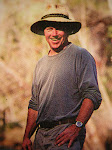7/20/08
It's a strange irony that we go to forests to escape civilization and yet the things we often find to be the most exciting are the traces of people who were there before us. And it doesn't take much. We stumble onto a deer trail and are mildly interested, but if that same trail has been worn deep by a thousand years of Indian foot traffic, we are fascinated. We wonder about the people who passed this way. Who were they? Where were they going? We visualize them running barefoot with news for a neighboring next village; skipping behind their parents; tip-toeing toward a deer seen crossing ahead; making long, determined strides toward a nearby town and waiting friends; strolling dejectedly from a village that had cast them out; limping with injuries from a recent battle; tripping over exposed roots. We wish we had seen them.
One ancient trail can be seen at Charles Spring. When early Indians chose follow an old deer trail leading to this spring, they could not have known they were pioneering a route that would eventually become one of the most important trails in the land. Today's history books refer to this road alternately (depending on the time period of that particular chapter) as the Old Spanish Road, the Mission Trail, and eventually as Florida's first Federal highway (in the original, pre-asphalt sense), Bellamy Road, which spanned the Florida Territory from St. Augustine to Tallahassee.
These days, there are few places where we can see this storied old trail. A section passing through O'leno State Park is one of the best. At Charles Spring, a vestigial section can be seen as a deep cut in the river bank leading down to the river. This served as a ramp for wagons to descend to the riverside and load onto a waiting ferry.
Nearby, an unassuming little trail enters the woods. A small green sign identifies it as the Old Bellamy Road. Following the overgrown trail into a plantation of young pines, we find ourselves, once again wondering about those who walked here before us. The trail ascends a sandy, wooded slope and we come to a small cemetery plot. We read the headstones of Rubin and Rebecca Charles who died in 1835 and 1849, and we wonder...
In addition to our paddle on the Suwannee, we have some great coastal trips this weekend at Cedar Key and Ozello (the Suncoast Keys. Here's the plan.
Tuesday, March 31, 2009
Subscribe to:
Post Comments (Atom)

No comments:
Post a Comment